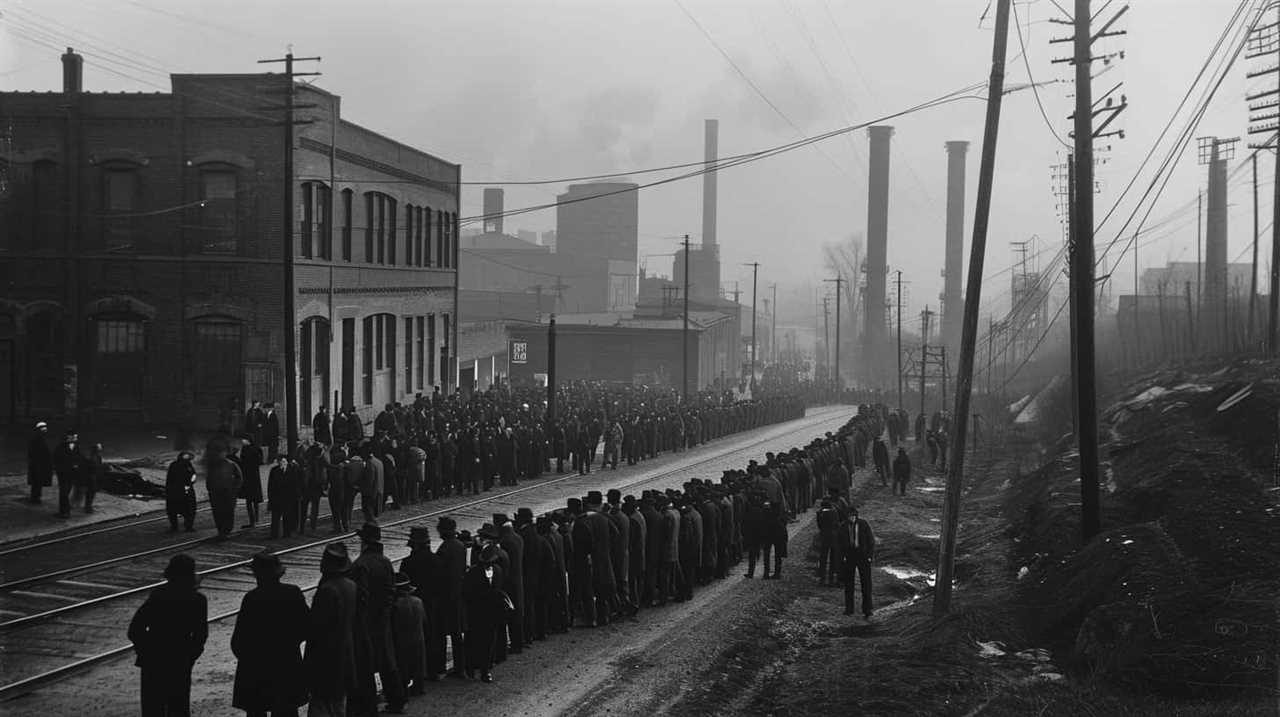Why did Marx emphasize class in economic theory?
Well, let me tell you, it was absolutely crucial! Marx, the innovative thinker that he was, recognized that class played a monumental role in shaping our economic systems.
He believed that the division of society into different classes, such as the bourgeoisie and the proletariat, was at the heart of the inequalities and injustices we see in capitalist societies.
By focusing on class, Marx aimed to uncover the exploitative nature of capitalism and inspire a revolution for a more equitable society. He saw class struggle as the driving force behind historical change, and believed that by understanding class dynamics, we could unlock the potential for a truly innovative and revolutionary future.

So, buckle up and let’s dive into the fascinating world of Marxian economics!
Key Takeaways
- Class struggle is a central concept in Marx’s economic theory, as it drives historical change and shapes the dynamics of economic systems.
- The capitalist class exploits the working class through the control of labor as a commodity and the extraction of surplus value from workers’ labor.
- Class analysis is a fundamental tool in understanding oppression and social inequality, as it reveals the distinct interests and power dynamics between different social classes.
- Designing equitable systems requires addressing the unequal distribution of wealth and resources, prioritizing the well-being of all individuals, and challenging class-based oppression.
Historical Context of Marx’s Economic Theory
In our analysis of the historical context of Marx’s economic theory, we’ll examine the socio-political conditions that influenced his emphasis on class. One key influence on Marx’s economic theory was the Hegelian philosophy of his time. Hegelian philosophy placed great importance on the role of ideas and the dialectical process in shaping history. Marx, who was deeply influenced by Hegel, applied this framework to his economic theory. He saw class struggle as the driving force behind historical change, with the bourgeoisie and the proletariat locked in a perpetual conflict over the means of production.
Marx’s economic theory wasn’t just an intellectual pursuit; it was closely intertwined with his political activism. Marx believed that understanding the economic structure of society was crucial for effecting meaningful political change. His theory aimed to expose the exploitative nature of capitalism and to rally the working class to overthrow it. Marx’s political activism was fueled by his conviction that the working class, as the most oppressed and exploited group, had the potential to bring about a more just and equal society.
Marx’s Critique of Capitalist Exploitation
Continuing from our previous discussion on the historical context of Marx’s economic theory, we can now delve into Marx’s critique of capitalist exploitation.

Marx argued that the capitalist system inherently exploits the working class through the extraction of surplus value from their labor. Here are three key points to consider:
- Capitalist Labor: Marx believed that under capitalism, labor becomes a commodity controlled by the capitalist class. Workers are forced to sell their labor power in exchange for a wage, leading to an unequal power dynamic between the bourgeoisie and the proletariat.
- Surplus Value: According to Marx, the value of a worker’s labor is greater than the wage they receive. This surplus value is appropriated by the capitalist as profit. Marx argued that this exploitation is inherent in the capitalist mode of production, as the capitalist class accumulates wealth at the expense of the working class.
- Exploitation: Marx viewed capitalist exploitation as a systemic and structural problem. He believed that workers were alienated from the products of their own labor and were reduced to mere instruments of production. This alienation, combined with the extraction of surplus value, perpetuates the cycle of exploitation and exacerbates class inequality.
Marx’s critique of capitalist exploitation remains highly relevant in today’s innovation-driven economy. Understanding the unequal power dynamics and exploitation inherent in capitalism can help us design more equitable and inclusive systems that prioritize the well-being of all individuals, rather than the accumulation of wealth for a few.
The Role of Class Struggle in Marxian Economics
Why did Marx emphasize the role of class struggle in Marxian economics?
Marx believed that class struggle played a crucial role in shaping the dynamics of economic systems. He argued that the primary source of wealth in capitalist societies is the labor of the working class, which is exploited by the capitalist class. This exploitation creates a fundamental inequality between the two classes, leading to a constant struggle for power and resources.

Marx viewed the role of labor as central to understanding the dynamics of inequality in economic systems. He argued that the working class, through their labor, create value that’s appropriated by the capitalist class. This unequal distribution of wealth and power creates a fundamental conflict of interest between the two classes, leading to class struggle.
The concept of class struggle in Marxian economics highlights the inherent contradictions and conflicts within capitalist societies. Marx believed that these conflicts would eventually lead to the overthrow of the capitalist class and the establishment of a classless society. By emphasizing the role of class struggle, Marx aimed to expose the exploitative nature of capitalism and inspire the working class to unite and fight for their rights.
Class as a Fundamental Category in Marxist Analysis
Throughout Marxist analysis, class is regarded as a fundamental category that underpins the understanding of economic theory. Class isn’t simply an economic category, but rather a social relationship that encompasses power dynamics, social inequality, and the analysis of oppression.
Here are three key reasons why class is considered crucial in Marxist analysis:

- Power dynamics: Class analysis recognizes that different social classes have distinct interests and positions within society. The ruling class, typically the bourgeoisie, holds economic and political power, while the working class, or proletariat, is exploited and marginalized. Understanding these power dynamics is vital in comprehending how economic systems operate and how social inequality is perpetuated.
- Social inequality: Class provides a lens to examine social inequality and its effects on individuals and communities. Marxist analysis highlights how the capitalist mode of production exacerbates inequalities in wealth, income, and access to resources. By focusing on class, Marxists seek to address these inequalities and promote social justice.
- Analysis of oppression: Class intersects with other forms of oppression, such as race, gender, and sexuality. Marxist analysis recognizes that class isn’t the only source of oppression, but it’s often intertwined with other social categories. By understanding class as a fundamental category, Marxists can uncover the ways in which different forms of oppression intersect and reinforce one another, leading to a more comprehensive analysis of societal inequalities.
Class Consciousness and Revolutionary Potential
Class consciousness and revolutionary potential are key concepts in Marxist theory.
Class consciousness refers to the awareness and understanding of one’s own class position and interests within the broader social hierarchy. It’s the recognition that social inequality and exploitation are inherent in capitalist societies. Marx argued that the working class, once conscious of its collective power, would be motivated to overthrow the capitalist system and establish a classless society.
The concept of class consciousness is crucial for understanding the revolutionary potential of the working class. It’s through class consciousness that individuals recognize their shared interests and unite in challenging the existing social order. By identifying the root causes of their exploitation, workers can organize and mobilize for collective action. This can take the form of strikes, protests, or even revolutions, as seen in historical examples such as the Russian Revolution and labor movements around the world.
However, the development of class consciousness isn’t automatic. It requires a process of education and collective action to overcome the dominant ideology that perpetuates class divisions and maintains the status quo. The ruling class, in order to maintain its power, often seeks to divide and weaken the working class by promoting false consciousness and individualistic values.

Frequently Asked Questions
How Did Marx’s Economic Theory Develop Over Time?
Marx’s economic theory developed and evolved over time, reflecting his analytical approach to understanding society. His emphasis on class was a crucial aspect of this development, allowing him to uncover the power dynamics and exploitation inherent in capitalist systems.
What Were the Major Influences on Marx’s Understanding of Class in Economic Theory?
Marx’s understanding of class in economic theory was shaped by major influences and developed over time. We can analyze the key factors that influenced him and trace the evolution of his ideas to gain a deeper understanding of his emphasis on class.
How Did Marx’s Ideas on Class Differ From Other Economic Theories of His Time?
Marx’s unique perspective on class in economic theory stemmed from his analysis of the class struggle inherent in capitalism. This marked a departure from other economic theories of his time, as he sought to contextualize and critique the existing system.
What Are Some Criticisms of Marx’s Emphasis on Class in Economic Theory?
Some criticisms of Marx’s emphasis on class in economic theory include its oversimplification of complex societal dynamics and its neglect of alternative perspectives on economic theory.

How Has Marx’s Emphasis on Class Influenced Contemporary Economic Thought?
Marx’s emphasis on class has had a profound influence on contemporary economic thought. It has shaped our understanding of inequality and has sparked social movements seeking to address economic injustices.
Conclusion
In conclusion, Marx’s emphasis on class in economic theory was a result of his analysis of capitalist exploitation and the historical context of his time. He believed that class struggle was a fundamental driver of economic and social change, and that understanding class dynamics was crucial for understanding the workings of the capitalist system.
By highlighting class as a central category in his analysis, Marx aimed to uncover the underlying power dynamics and inequalities inherent in capitalist societies. This perspective continues to resonate today, reminding us of the ongoing relevance of Marxist analysis in understanding economic and social issues.









